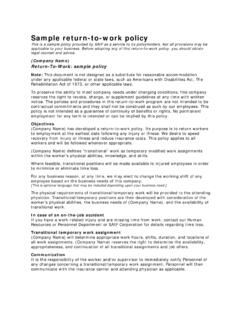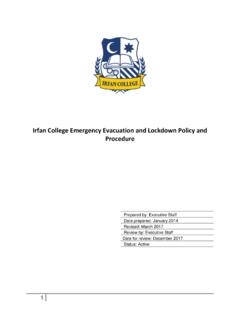Transcription of Sample Psychotropic Medication Policy and Procedure
1 Sample Psychotropic Medication Policy and Procedure May Also Be Used To Improve Care to Dementia Residents The following attached tools are available on the CMS Advancing Excellence website 1. Sample Psychotropic Medication Policy and Procedure 2. Sample Psychopharmacologic Interdisciplinary Medication Review 3. Provider Checklist Suggestions for Improving Dementia Care in Nursing Homes 4. Questions to Consider in Interdisciplinary Team Review of Dementia Care Cases 5. Self-Assessment State Coalition Provider Question Worksheet 6. Provider Dementia Care Implementation Flow Diagram Developed under the Partnership to Improve Dementia Care in Nursing Homes Sample Policy AND Procedure Psychotropic Medication Sample Psychotropic Medication Policy and Procedure Shared with Permission of Karyn Leible, RN, MD, CMD Policy : Physicians and mid-level providers will use Psychotropic medications appropriately working with the interdisciplinary team to ensure appropriate use, evaluation and monitoring.
2 Standards: 1. The facility will make every effort to comply with state and federal regulations related to the use of psychopharmacological medications in the long term care facility to include regular review for continued need, appropriate dosage, side effects, risks and/or benefits. 2. The facility supports the appropriate use of psychopharmacologic medications that are therapeutic and enabling for residents suffering from mental illness. 3. The facility supports the goal of determining the underlying cause of behavioral symptoms so the appropriate treatment of environmental, medical, and/or behavioral interventions, as well as psychopharmacological medications can be utilized to meet the needs of the individual resident. 4. The facility supports the goal of determining the underlying cause of residents having difficulty sleeping so the appropriate treatment of environmental or medical interventions can be utilized prior to psychopharmacologic Medication use.
3 5. Efforts to reduce dosage or discontinue of psychopharmacological medications will be ongoing, as appropriate, for the clinical situation. 6. Psychopharmacological medications will never be used for the purpose of discipline or convenience. 7. Psychotropic medications include: anti-anxiety/hypnotic, antipsychotic and antidepressant classes of drugs. Sample Policy AND Procedure Psychotropic Medication Responsible Party Actions Required: Primary Care Physician, PA or APN 1. Orders for Psychotropic Medication only for the treatment of specific medical and/ or psychiatric conditions or when the Medication meets the needs of the resident to alleviate significant distress for the resident not met by the use of non-pharmacologic approaches. 2. Documents rationale and diagnosis for use and identifies target symptoms. 3. Documents discussion with the resident and/or responsible party regarding the risk versus benefit of the use of these medications included in the discussion and documentation must be the presence of any black box warning or off label use of the Medication affecting the prescribing of the Medication to the resident.
4 4. Evaluates with the interdisciplinary team, effects and side effects of psychoactive medications within one month of initiating, increasing, or decreasing dose and during routine visits thereafter. 5. Monitors the resident for lack of drug efficacy clinically and in discussions with the interdisciplinary team within one month of initiating and during routine visits. 6. Attempt a gradual dose reduction (GDR) decrease or discontinuation of Psychotropic medications after no more than 3 months unless clinically contraindicated. Gradual dose reduction must be attempted for 2 separate quarters (with at least one month between attempts). Gradual dose reduction must be attempted annually thereafter or as the resident's clinical condition warrants. 7. Sedative/ hypnotics will be reviewed quarterly for gradual dose reduction. GDR must be attempted quarterly unless clinically contraindicated.
5 8. Orders for PRN Psychotropic medications will be time limited ( , times 2 weeks) and only for specific clearly documented circumstances. 9. Obtains psychiatric consultation as resident's clinical condition requires. Sample Policy AND Procedure Psychotropic Medication Psychiatrist/mental health (When available to a facility) 1. May assist the facility in establishing appropriate guidelines for use, dosage and monitoring of Psychotropic medications. 2. Uses the above standards (1-9) in recommendations to physicians. 3. Provides in service training to nursing, medical, and other staff as appropriate. 4. Is available for consultation. 5. Helps develop behavior management plans. Nursing 1. Monitors Psychotropic drug use daily noting any adverse effects such as increased somnolence or functional decline. 2. Will monitor for the presence of target behaviors on a daily basis charting by exception ( , charting only when the behaviors are present).
6 3. Reviews the use of the Medication with the physician and the interdisciplinary team on a quarterly basis to determine the continued presence of target behaviors and or the presence of any adverse effects of the Medication use. 4. AIMS will be performed on any resident on and antipsychotic on a quarterly basis changes will be reported to the physician. 5. May develop behavioral care plans. Social Services 1. Maintains a list of residents in the facility on psychoactive medications. 2. Coordinates the interdisciplinary team resident reviews of psychoactive medications. 3. May develop behavioral care plans. Pharmacist and/or consulting pharmacist 1. Monitors Psychotropic drug use in the facility to ensure that medications are not used in excessive doses or for excessive duration. 2. Participates in the interdisciplinary quarterly review of resident's on psychoactive medications. 3.
7 Notifies the physician and the nursing unit if whenever a Psychotropic Medication is past due for review. Sample Policy AND Procedure Psychotropic Medication Medical Director 1. Reviews Psychotropic Medication Policy with the interdisciplinary team at least annually. 2. Monitors the overall use of these medications in the facility through the QAPI process. 3. Identifies any resident care or potential regulatory issues with the use of Psychotropic medications in the facility and discusses with the medical staff as appropriate. 4. Participates in the interdisciplinary quarterly review of resident's on psychoactive medications and facilitates communications with attending physicians of any recommendations from the IDT. Psychopharmacologic Interdisciplinary Medication Review Shared with Permission of Karyn Leible, RN, MD, CMD Resident: _____ Date of review:_____ Reason for Review: _____ Initiation _____ Dose reduction consideration _____ Dose reduction review _____ Change in condition Diagnosis for psychopharmacologic Medication use: _____ Other diagnosis: _____ Medication to be reviewed: _____ Date started _____ Last review _____ Last GDR attempt _____ Other Medications: _____ Target behavior/symptom _____ _____ Decline in frequency _____ No longer present _____ No change Target symptom/behavior non-pharm interventions present in care plan _____ Documentation of effectiveness _____ Evidence of adverse effects or functional decline.
8 _____ Falls _____ Increased assistance for ADLs _____ Somnolence _____ Weight loss _____ Decreased oral intake (fluids) _____ Decreased mobility _____ Insomnia _____ Restlessness Other: _____ Recent Pain Assessment _____ Recent sleep study (if indicated) _____ AIMS _____ Date _____ Score BIMS _____ Date _____ Score PHQ 9 _____Date _____ Score Pertinent laboratory studies: _____ Risk/benefit discussion with resident or MDPOA documented at initiation of Medication : _____ Date _____ Sample Policy AND Procedure Psychotropic Medication Committee Recommendations: Response: Practitioner Signature and date: Committee Members: Sample Policy AND Procedure Psychotropic Medication Partnership to Improve Dementia Care in Nursing Homes Suggestions for Provider Checklist % of residents in facility on atypical antipsychotics: _____ Quality Measure State Percentile Rank antipsychotics: _____ YES NO Staff in all departments, are trained in person-centered care and how to respond effectively to behaviors (access Sample training programs on Advancing Excellence website; Hand in Hand).
9 In addition to medical and psychiatric history, recent changes in behavior or cognition and other standard clinical evaluations, at admission information is obtained from the resident, family, and/or caregivers on the resident's preferences, routines, pre-dementia personality, social patterns, responses to stress and effective interventions. The information obtained on during the admission process is conveyed to direct caregivers. This admission information is integrated into the care plan and may be revised over time as the resident's condition and needs change. Interviews with staff demonstrate that they have implemented and are following the care plan, continue to seek input from family members or care givers for unresolved issues, and communicate with practitioners regarding change in condition or new or persistent symptoms. If a resident is placed on an antipsychotic Medication , there is documentation in the record that the resident or appropriate legal representative was involved in the decision.
10 Facility has consistent staff assignments (same Certified Nursing Assistant to same resident 5 days/week). Certified Nursing Assistant to Resident Ratio 1st shift/2" shift/3`d shift Senior leadership (Nursing Home Administrator, Director of Nursing, Medical Director) attend care plan meetings periodically for residents with unresolved behavioral or psychological symptoms of dementia. Interdisciplinary team seeks input at care plan meetings from the Medical Director, Consultant Pharmacist and Certified Nursing Assistants for residents with behavioral or psychological symptoms. Providers conduct outreach and education to the resident's family and strongly encourage their participation in care plan meetings (offering to flex the schedule or use conference calls when the family cannot physically be in attendance). Nursing Home Administrators and Directors of Nursing review quality measures ( , monthly) and use the Quality Measures report to identify residents who may need alternative interventions and oversee their implementation.







